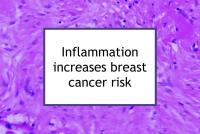Systemic inflammation is a persistent state that involves the chronic activation of the immune system. Inflammation has been shown to promote the transformation of normal cells into cancer cells by activating distorted inflammatory signaling. Now a new study has reported that inflammatory diets are linked to increased breast cancer risk.
Causes of inflammation
Diet and lifestyle choices influence the level of inflammation. Regular exercise can reduce it. High consumption of dietary fiber has also been shown to be associated with low levels of inflammation in breast cancer survivors. Generally speaking, a diet abundant in fruits, vegetables and healthy fats reduces inflammation.
On the other hand, obesity increases inflammation, as does metabolic syndrome and elevated levels of LDL cholesterol (low-density lipoprotein, the "bad" cholesterol). Cigarette smoking also increases inflammation.
The typical U.S. diet results in a state of chronic inflammation. Pro-inflammatory foods include most of the oils typically used in cooking and baking, as well as more well-known unhealthy foods:
- Alcohol, all types
- Bacon and other processed meats
- Butter
- Cheese, full fat
- Coconut oil
- High-fructose corn syrup
- Lard (shortening)
- Milk, full fat, and cream
- Concentrated sources of omega-6 fats, such as corn oil, soybean oil, sunflower oil and safflower oil
- Partially hydrogenated oil
- Red meat such as beef, pork and lamb
- Sugar
- White bread, white flour pasta, and other highly refined wheat flour products
- Well-done or fried meat or fish of any type
In other words, some of the most frequently consumed foods in the U.S. (e.g., pizza, hamburgers, fried chicken, pasta, donuts, ice cream, and soda) are highly inflammatory. Adding healthy foods to a diet that heavily features the foods above is unlikely to be a successful strategy for reducing inflammation.
Latest research finds inflammatory diet promotes BC
The study referenced above was designed to investigate the association between diet-related inflammation breast cancer risk. To conduct the study, the authors used data concerning 67,879 French women in the E3N cohort. The E3N cohort was established in 1990 to investigate factors associated with cancer and other major non-communicable diseases in women. Follow-up questionnaires addressing general and lifestyle factors, as well as medical events, are sent to the women every two to three years.
Study participants were followed from 1993 to 2014, during which time 5,686 were diagnosed with breast cancer. The food frequency questionnaire administered in 1993 was used to calculate a modified Dietary Inflammatory Index (DII) for each woman. DIIs are derived from food frequency questionnaires plus data on the inflammatory potential of foods.
The median DII score of study participants was a mildly pro-inflammatory +0.39. DII varied from -4.68 in the lowest quintile to +4.29 in the highest quintile. Risk of breast cancer was found to increase linearly with DII. Those in the highest DII quintile experienced a 13% higher risk of breast cancer than those in the lowest quintile. The authors conclude that the results imply a positive association between DII and breast cancer risk and that the promotion of anti-inflammatory diets could contribute to breast cancer prevention.
Please see our article on inflammation and the inflammation tag for more information.
